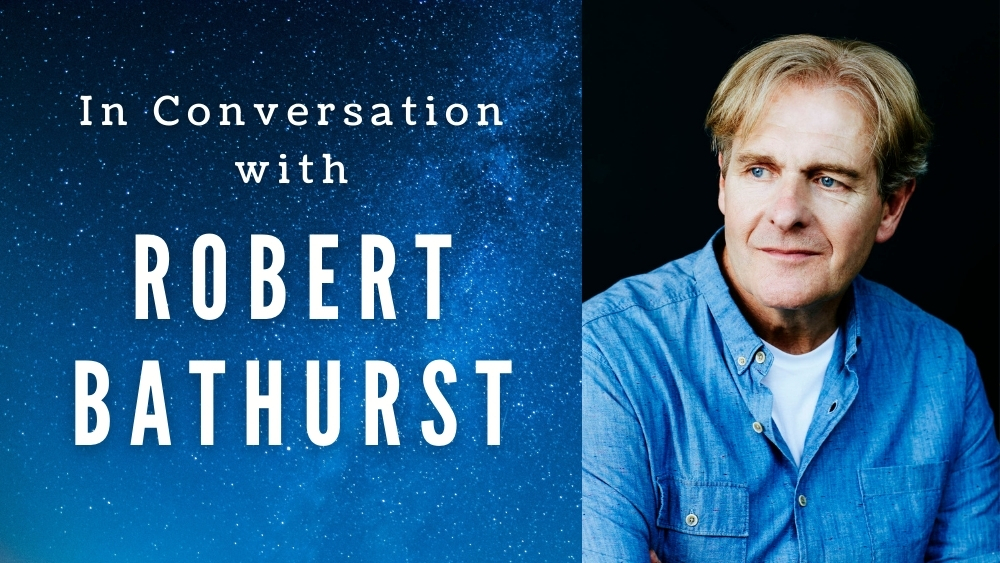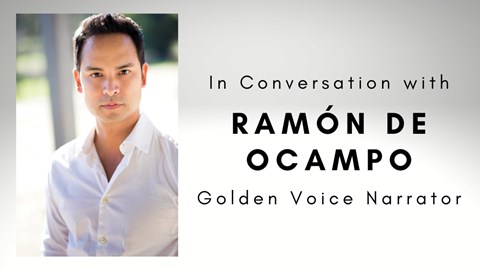
Narrator and actor Robert Bathurst joins host Jo Reed for a conversation about his journey to audiobook narration and his performances of the much-loved mystery audiobook series by Canadian author Louise Penny. ALL THE DEVILS ARE HERE is Penny’s 16th outing starring Chief Inspector Gamache, and it’s one of AudioFile’s picks for the 2020 Best Mystery Audiobooks. Fans adore spending time with the residents of Quebec’s Three Pines and the insightful Gamache, and it’s a treat to discover more about the series from the Earphones Award- and Audie Award-winning narrator.
Listen to Jo and Robert’s conversation below, and read on for a partial transcript.
Partial Transcript:
 Robert Bathurst: She’s written this series set in a mythical village in the state of Quebec. It’s a village that isn’t on the map, and there’s a sort of a mystical, spiritual element to it, really, which I think takes it away from being just an ordinary cop story. It isn’t process-driven. It’s driven by other things, and spiritual with a small S, in some ways, because what she’s created is almost a manifesto for how to live well in a cruel world. It just shows that despite all the ghastliness and the terror and the violence and the murder, that good does exist, and that seems to be the underlying message of it all. Of course, you never know quite what’s going to happen, and you don’t know whether evil will prevail, and you’re always on the edge of your seat with all her plotting, which is cast iron. It’s brilliantly constructed, and the central figure is this man called Armand Gamache, who is, I think, loosely based, really, on Louise’s late husband, Michael, and he’s very tough. He’s flawed, of course, like so many heroes of mystery drama, but he presides over a story which is both utterly humane and just simply excitingly told.
Robert Bathurst: She’s written this series set in a mythical village in the state of Quebec. It’s a village that isn’t on the map, and there’s a sort of a mystical, spiritual element to it, really, which I think takes it away from being just an ordinary cop story. It isn’t process-driven. It’s driven by other things, and spiritual with a small S, in some ways, because what she’s created is almost a manifesto for how to live well in a cruel world. It just shows that despite all the ghastliness and the terror and the violence and the murder, that good does exist, and that seems to be the underlying message of it all. Of course, you never know quite what’s going to happen, and you don’t know whether evil will prevail, and you’re always on the edge of your seat with all her plotting, which is cast iron. It’s brilliantly constructed, and the central figure is this man called Armand Gamache, who is, I think, loosely based, really, on Louise’s late husband, Michael, and he’s very tough. He’s flawed, of course, like so many heroes of mystery drama, but he presides over a story which is both utterly humane and just simply excitingly told.
 Jo Reed: I have to say—we’ll talk about the current book in a moment, but the character of the village of Three Pines and its inhabitants are so central. I love them! I love the bistro. I love the bookstore. I love the boulangerie, and I’m always so thankful the weather is so central, so I don’t think it’s paradise, because I just think winter there would be so horrible. But I just listen to them with this kind of longing.
Jo Reed: I have to say—we’ll talk about the current book in a moment, but the character of the village of Three Pines and its inhabitants are so central. I love them! I love the bistro. I love the bookstore. I love the boulangerie, and I’m always so thankful the weather is so central, so I don’t think it’s paradise, because I just think winter there would be so horrible. But I just listen to them with this kind of longing.
RB: Yes. They’re very sensual. In amongst all the police stuff and the murders and the terrible huge big themes of consequence to the whole world, not just in that region, they are deeply sensual, and you feel the warmth of the bistro. You can taste—she’s very good on food.
JR: Oh, is she good on food.
RB: I think you could do a series of recipes, really, from the Gamache books. She talks about food, and you can smell the wood smoke fire and the enormous comfort, because Three Pines, in her mind, and it comes across in the books, is a place for people who are essentially lost, who have got something to sort of yearn for, and Three Pines is a sanctuary. Okay, Three Pines also has a lot of things happening in it which are ghastly, but at root, it is a place where people who live there have found sanctuary and ultimately, of course, most of the books return to Three Pines when there is some resolution there, and Three Pines is always such a draw for the reader as well as the characters who live there.
 JR: Friendship and food are so central to these books. We mentioned food, but friendship, too, and the friendship that the central characters have, the six or seven central characters, recurring characters, which is really quite lovely.
JR: Friendship and food are so central to these books. We mentioned food, but friendship, too, and the friendship that the central characters have, the six or seven central characters, recurring characters, which is really quite lovely.
RB: Yes. The word love is key to it. It is this—it’s not unsaid, because they often do say they love each other, but there is this unqualified love, which runs through it. It’s almost sort of unfashionable to write about it, and in different hands, it might not have the same effect, but it does remind one of the human capacity for love, and I think that prevails in all the books.
—
Read AudioFile’s reviews of all of the Louise Penny audiobooks, and listen to Behind the Mic all next week for more conversations with the narrators of this year’s best audiobooks.
Robert Bathurst photo courtesy of the narrator.







